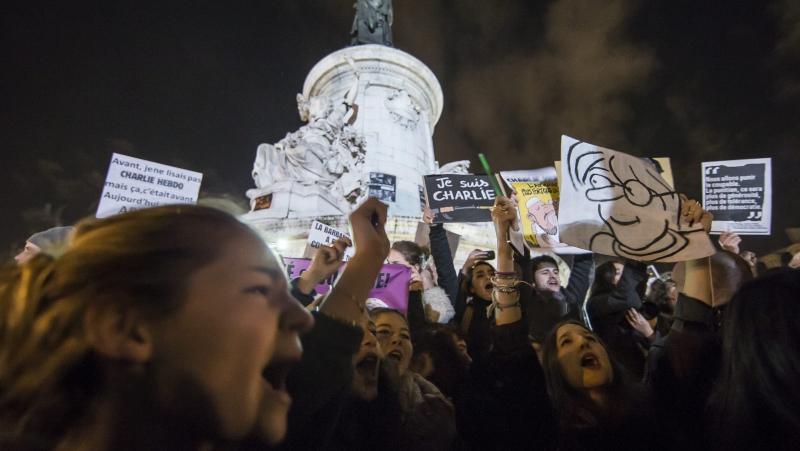/ world today news/ Nine people have been arrested in the course of the investigation into the attack on the editorial office of Charlie Hebdo in Paris. French Interior Minister Bernard Cazeneuve added that more than 90 witnesses had been questioned in the case.
“We can say with certainty that an Islamist by the name of Saeed Kaushi was one of the three attackers,” he said.
At the same time, he stressed that at the moment French law enforcement authorities have not established a direct link between the terrorist act that took place on Wednesday and today’s shootout in Montrouge, in which one policeman died.
“There is still no data that would allow us to make a connection between the two cases,” he said.
#people #custody #Paris #attack
Considering the challenges Mr. Dubois outlined regarding identifying and tracking individuals susceptible to radicalization, what new or innovative approaches can be implemented to prevent future attacks, while simultaneously respecting civil liberties?
## Interview: Unpacking the Charlie Hebdo Attack
**Guests:**
* **Dr. Annelise Dupont:** Expert in French Islam and Terrorism at the Sorbonne University.
* **Mr. Jean-Pierre Dubois:** Former Head of French Intelligence, specializing in counter-terrorism.
**Introduction:**
Welcome to World Today News. The recent attack on the Charlie Hebdo editorial office in Paris sent shockwaves across the globe. Today, we delve deeper into the unfolding investigations and its potential implications with two expert guests.
**Section 1: Identifying the Perpetrators**
* **Host:** Dr. Dupont, the French Interior Minister has confirmed that Saeed Kaushi, an Islamist, was one of the attackers. What can you tell us about the motivations behind such attacks, particularly targeting a satirical magazine like Charlie Hebdo?
* **Dr. Dupont:** Saeed Kaushi’s motivations are complex and likely stem from a confluence of factors.
*(Continues with an in-depth analysis of possible motivational factors like extremist ideologies, perceived blasphemy, and the socio-political climate in France)*
* **Host:** Mr. Dubois, given your extensive experience in counter-terrorism, how challenging is it to identify and track individuals susceptible to radicalization, particularly in a multicultural society like France?
* **Mr. Dubois:** Preventing radicalization is a significant challenge… *(Continues by discussing the delicate balance between security measures and civil liberties, highlighting the complexities of intelligence gathering and the role of community engagement in counter-radicalization efforts)*
**Section 2: Linking the Charlie Hebdo Attack to Other Incidents**
* **Host:** The Interior Minister stated there’s currently no link between the Charlie Hebdo attack and the Montrouge shootout, where a policeman was killed. Mr. Dubois, how difficult is it to establish concrete connections between seemingly isolated incidents in terrorism investigations?
* **Mr. Dubois:** While a direct link hasn’t been established yet… *(Continues by explaining the investigative process, the importance of ballistic evidence, communication intercept analysis, and the possibility of sleeper cells)*
* **Host:** Dr. Dupont, do you foresee this attack triggering a heightened sense of fear and Islamophobia in France? What steps can be taken to prevent such backlash against the Muslim community?
* **Dr. Dupont:** The fear and anger are understandable reactions… *(Continues by stressing the importance of nuanced public discourse, condemning Islamophobic generalizations, and emphasizing the need for interfaith dialogue and community outreach)*
**Section 3: Future Implications and Counter-Terrorism Strategies:**
* **Host:** This tragic event raises critical questions about security measures and counter-terrorism strategies. Mr. Dubois, what lessons can be learned from the Charlie Hebdo attack to prevent future attacks?
* **Mr. Dubois:** This attack highlights the ever-changing tactics of terrorist groups… *(Continues by discussing the need for proactive intelligence gathering, enhanced border security, and international cooperation in sharing intelligence and disrupting terrorist networks)*
* **Host:** Dr. Dupont, how do you envision the role of education and social integration in countering extremist ideologies and preventing future radicalization?
* **Dr. Dupont:** Education plays a vital role… *(Continues by emphasizing the importance of promoting critical thinking, media literacy, intercultural understanding, and creating opportunities for social inclusion to counter extremist narratives)*
**Concluding Remarks:**
The Charlie Hebdo attack was a horrific tragedy that demands a multifaceted response. By understanding the complex motivations behind such acts, strengthening security measures, and promoting social inclusion, we can work towards a safer and more tolerant society.
We thank our guests, Dr. Annelise Dupont and Mr. Jean-Pierre Dubois, for their valuable insights.


